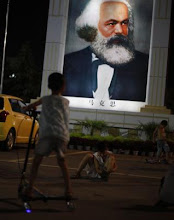Vietnam and China: What is the difference?
In January 2008, one and a half years after our tendency decided that in China there has been a capitalist counter-revolution, Alan Woods states that that has not happened in Vietnam.
“Today Vietnam faces a new threat - the threat of capitalist restoration, which is already far advanced in China. Department stores sell French perfumes and Italian shoes to an emerging urban Vietnamese middle class. A French-owned five-star hotel has opened across the street from the US consulate. Even in the annual victory parade some floats, sponsored by Vietnamese banks, sport the logo of American credit card companies. US warships are allowed to visit Vietnamese ports. In Ho Chi Minh City, the renamed capital, a new elite of Vietnamese businessmen is enjoying the good life in trendy bars and restaurants, toasting business success and the new market economy. The privately owned businesses are engaged in the ruthless exploitation of the workers, just as they do now in Russia and China.
The United States has now become Vietnam's single-largest trading partner. US imperialism may yet achieve through trade and investment what it failed to achieve with bombs and napalm. Was it for this that the workers and peasants of Vietnam fought with such inspiring heroism and defeated the mightiest imperialist power the world has ever seen? Will they allow the bureaucracy to privatise the economy and, like China, lead Vietnam back to capitalism? Or will the working class fight against the pro-capitalist elements and lead Vietnam onto the road of genuine Leninist socialism, based on the democratic control and administration of the working people themselves? This question has not yet been answered by history. It is our fervent hope that it will be the second variant and not the first. The working people of Vietnam deserve no less!” (our emphasis throughout)
http://www.marxist.com/tet-offensive-offensive-part-two.htm
Unlike Alan, and presumably the whole of the IS, we are unable to detect any fundamental difference between China and Vietnam.
Consider the facts:
1. Both Vietnam and China have abolished the state monopoly of foreign trade and joined the World Trade Organisation.
2. Both China and Vietnam promote foreign investment by multinational companies. Vietnam offers cheaper labour than China.
3. Both China and Vietnam have a super rich at one end of the wealth spectrum and a slave trade at the other.
4. The proportion of the economy in state hands in China and Vietnam is similar, but the state sector is far more powerful in China than Vietnam. The states proportion of investments in fixed assets is greater in China than in Vietnam.
5. The proportion of the workforce that works for the state in China is higher than in Vietnam.
6. State Owned Enterprises function within the market. The plan is carried out through an economy dominated by market relations.
7. The ideology dominating the ruling party in Vietnam is an almost exact replica of that adopted in China.
8. In neither country have there been any major conflicts within the leadership in the past twenty years.
9. If anything a capitalist counter-revolution would be easier in Vietnam. 76% of the population in Vietnam are rural inhabitants. The state sector is weaker. The economy is weaker with higher inflation and greater indebtedness.
If you agree with China’s Long March to Capitalism then it must follow that Vietnam is also capitalist. In which case the two fastest growing economies in the Asia are both capitalist, and they will become the model of future capitalist societies seeking to escape the limitations imposed by imperialism.
If China and Vietnam are not capitalist states, then the Marxist theory of the superiority of a planned economy based on the nationalisation of the commanding heights of the economy is proven in the language of the unprecedented economic development experienced over the last decades in both countries.
Thursday, 26 November 2009
Subscribe to:
Post Comments (Atom)

No comments:
Post a Comment